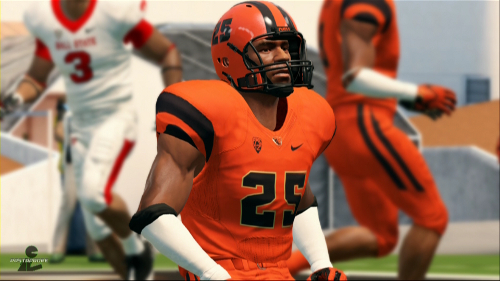O’Bannon Case is Over; Resolution and Ramifications Still A Long Ways Away

The case that could change the landscape of college athletics, and was the catalyst that led to the cancellation of the NCAA Football series, has come to a conclusion. The decision in Ed O’Bannon v. NCAA is now fully in the hands of U.S. District Judge Claudia Wilken who is expected to make the ruling in August.
Throughout the trial observers noted the plaintiffs were dominating the proceedings, and that it seemed as though the NCAA was more concerned with cultivating arguments for appeals than winning this stage. However the final day was by far the strongest for the NCAA and now the judge’s determination seems to be much more in question.
Regardless of what the ruling is the matter likely won’t be settled completely for several more years. The losing party will appeal and continue to do so all the way to the Supreme Court which would choose to hear the case or pass on it. College-based video games won’t be back until at least then and maybe longer depending on the system put into place to pay players and whether publishers would determine profit was still there to be made considering the increased development and licensing costs.
Earlier/Summary Below
The player likeness lawsuit against the NCAA, CLC, and Electronic Arts is the culmination of two high profile filings that were combined as led by Sam Keller and Ed O’Bannon (and O’Bannon now heads it up). It alleges improper use of player likeness through various forms of merchandise and media including video games in which the parties in question conspired to avoid paying players for their rights. Some interesting details and claims regarding the case at hand were revealed when EA was reentered as a defendant after initially being dismissed.
EA originally won a previous case regarding player likeness with the courts ruling video games are artistic works rather than commercial speech and therefore protected by the First Amendment. The Supreme Court in 2011 established forms of media, producing expressive works of art, are not subject to judgments based on incorporating someone’s name or likeness. That dismissed case however, involving Ryan Hart, has resurfaced after an appeals court reversed a decision based on that argument.
Recent uncovered emails have shown that NCAA representatives were well aware that players in games were based off real-life players. At one point the NCAA and EA had nearly reached an agreement to have actual player names included in the products. The EA Locker / Roster Share feature was a fallback option. With momentum clearly on the plantiffs’ side NCAA reps have begun to publicly express concern over the future of collegiate sports. A former EA Sports producer admitted players in NCAA games were based off real athletes.
The discovery of Tim Tebow’s name being in NCAA Football 10 could throw another wrench into EA’s series of arguments. Depositions from former Alabama wide receiver Tyrone Prothro and UConn basketball guard Tate George support the defendant’s reasoning for denying class action certification. The class action hearing resulted in the judge heavily questioning the legitimacy of a potential class and insisting a current athlete be involved. The judge required current athletes be added as plaintiffs for that party to have representation if the case is certified as class action. Six current college football players were added as plaintiffs in mid-July.
EA is now arguing to be dismissed as a defendant in the suit. A major defense for the company however was recently struck down by an appeals court.
This consolidated case in California if certified as class action would go to trial – barring a settlement – and ultimately be the determining factor of how the NCAA proceeds in the future handling broadcasting rights, merchandising, and video games. Should a negative result come down, which one analyst has pegged as being a potential loss of $1 billion for EA, it would likely not just end the NCAA Football series but also with it any realistic possibility of college sports games being made in the future. The trial now is slated to begin June 9, 2014. Appeals following a decision could extend the fight through 2020.
[SEMI-RESOLUTION] EA and the CLC have settled the lawsuit. EA Sports will no longer produce a college football game. Getting out of the lawsuit only cost EA and CLC $40 million. The NCAA also settled their part in the video game aspect of the lawsuit for $20 million.
EA Sports testified in the case that the company would like to make college football and basketball games in the future.
